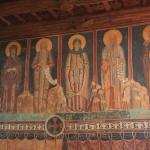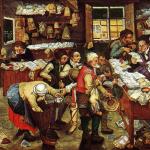 Jesus warned us that we should not go to him seeking signs because it is indication of a lack of faith (cf. Matt. 16:4) Nonetheless, he understood the human condition and its needs; signs are helpful, but they have to come from God and not our expectation of them. This is why he said he would give only one sign, the sign of Jonah, the sign of grace and redemption from sin.
Jesus warned us that we should not go to him seeking signs because it is indication of a lack of faith (cf. Matt. 16:4) Nonetheless, he understood the human condition and its needs; signs are helpful, but they have to come from God and not our expectation of them. This is why he said he would give only one sign, the sign of Jonah, the sign of grace and redemption from sin.
Sadly, this is not enough for many of us. We want more signs. Our pride and vainglory assume that God must approve us as we are, that we are great and we want God to show it to others by giving us a miracle. We test God like Satan did out in the desert, and it should not be surprising then that we are rebuffed from our efforts, giving us no demonstrable sign.
This is not to say no sign will be given. Those who ask for a sign might get it. The problem is that the sign will not be from God. Either we will read into things too much and assume some circumstantial event as a great sign, or worse, we will open ourselves up to some outside deception, where some charlatan or malevolent power will take the opportunity given by our desire and use us as their play thing. St. John Chrysostom made it quite clear – those who seek such a sign will all kinds of devils ready to give it to them, drawing them into wickedness:
“An evil and adulterous generation seeketh after a sign.” Now what He saith is to this effect: What marvel if ye behave so to me who have been hitherto unknown to you when even to the Father, of whom ye have had so much experience, ye have done the very same? forsaking Him, ye have run unto the devils, drawing to yourselves wicked lovers.[1]
Nonetheless, this is not to say we will receive some sort of supernatural sign; it is more than likely that we will mislead ourselves without such intervention. Most forms of prelest, spiritual delusion, comes from ourselves. It is through our own self-made delusion that other forms of delusion are possible, for they take the error which we have established for ourselves and add to it, merging with it, directing us further into error. Yet, the root cause is our own self-deception, coming out of the root sins such as avarice, pride, and hate. As long as we let our pride take over, it will make us unwilling to accept correction from those who have compassionate authority and true knowledge. We will excuse ourselves from having to listen to them because we think we know better, and if their views strongly contend against ours, we then begin to think all kinds of ill things about them, so that we end up not only rejecting their correction but we end up undermining their authority and so end up leading not only ourselves, but many others, astray.
Supernatural signs, if we get them, should not be held on to, as St. Edith Stein indicated. If they are from God, we still might misunderstand them, while if they are not from God, then we should fear understanding and following them:
The bodily eyes may be shown images and persons from the other world: angels or saints, or unusual shining lights. One can hear extraordinary words, smell the sweetest fragrance, savor exquisite tastes, or feel extreme delight through the sense of touch. A person should refuse to attend to this, without seeking to examine whether it is good or bad. To be sure, these things may come from God but there is no certainty about that.[2]
Humility is necessary; we must recognize we might be wrong. When we think we cannot be in error, we already are due to our pride. We hold on to what limited aspects of the truth we know and extrapolate from them instead of letting the fullness of the truth reveal itself to us. Insofar as we are still on a spiritual journey towards perfection, we must recognize we have not achieved it and so do not possess the fullness of truth in ourselves. We must keep in mind our imperfection, our ignorance, realizing that such ignorance is indication that we are still sick and wounded; this is the normal human position:
Spiritual deception is the wounding of human nature by falsehood. Spiritual deception is the state of all men without exception, and it has been made possible by the fall of our original parents. All of us are subject to spiritual deception. Awareness of this fact is the greatest protection against it. Likewise, the greatest spiritual deception of all is to consider oneself free from it. We are all deceived, all deluded; we all find ourselves in a condition of falsehood; we all need to be liberated by the Truth. The Truth is our Lord Jesus Christ (Jn. 8:32-14:6).[3]
Recognizing our weakness and our imperfection, we should be able to overcome pride and allow humility take over. This means that we will need others to help overcome our deficiencies. We are better when we come together with others in a spiritual community; each person will come with their own particular gifts and insights which complement each other and help counter each other’s delusions, so that we are better off in such a community than if we try to overcome our delusions by ourselves. For, not only will we end up having no on there to correct us and tell us when we are wrong, our pride easily rises up and causes us to think ourselves as superior to others:
Likewise, in the case of this virtue as well, do not convince yourself that you are wise, but that you have need of others and of help from God. Nothing is worse than a person thinking he is sufficient to himself. This way leads to ignorance; such people cannot bear to learn from anyone, they are conceited and feel superior to everyone else. [4]
We must recognize that we are sick pilgrims seeking our true homeland, the kingdom of God. As long as we make this pilgrimage together, we should go forward with God rejoicing and celebrating what good we receive, helping each other as we trip and fall. Together, with the grace of God, we shall be able to find our goal. But when we cut ourselves off from our fellow pilgrim, when we ignore those who have journeyed on ahead and seek alternative byways, or if we stop helping each other, we shall find the journey treacherous and it is quite possible we will falter and perish far from our spiritual homeland of the kingdom of God.
We must recognize that in our weakened condition, we are able to journey because of the grace given to us. We are weak. We will falter. We will stumble. But, despite all of that, we must not despair. God will give us the grace; we do not have to rely upon ourselves. Indeed, as St. Augustine argued, if we think we can save ourselves, we will end up perishing. It is because of God, and his merciful love, we know we can be saved. Thus, as Pseudo-Macarius preached, the damage done to sin has to be uprooted by God: “Still, to uproot sin and the evil that is so imbedded in our sinning can be done only by divine power, for it is impossible and outside of man’s competence to uproot sin. To struggle, yes, to continue to fight, to inflict blows, and to receive setbacks is in your power. To uproot, however, belongs to God alone.”[5]
Mercy and grace are paramount; the law indicates to us how and why we stumble, but mercy and grace is able to overcome our weakness and so help us get back on our feet and continue with the people of God in our earthly pilgrimage to the kingdom of heaven. As the path and journey is constantly changing, so the mercy and grace which we need is likely to change. Those who get upset at changes in discipline, geared for the sake of mercy, risk losing mercy for themselves; if they seek a sign to indicate their refusal to give mercy is correct, they might find it, but woe to those who heed such a sign because they will risk losing the merciful grace which they need for their own salvation. This is a lesson the pilgrim church has consistently taught throughout the centuries; whenever some group or another would absolutely deny mercy and grace to others, the pilgrim church reassured the sick pilgrims they were welcome and would be given medicine to cure them from their wounds, and those who denied this found themselves left behind as the church continued its journey. [6]
Today there are those who are so legalistic that they reject pastoral mercy; let us not heed them lest we find ourselves also left behind.
[Image= Colmenar Viejo. Camino de Santiago. Madrid by Edescas2 (Own work) [GFDL (http://www.gnu.org/copyleft/fdl.html) or CC BY-SA 4.0-3.0-2.5-2.0-1.0 (https://creativecommons.org/licenses/by-sa/4.0-3.0-2.5-2.0-1.0)], via Wikimedia Commons]
[1] St John Chrysostom, “Homilies on Matthew,” in NPNF1(10): 273.
[2] St Edith Stein, The Science of the Cross. trans. Josephine Koeppel, O.C. D. (Washington, DC: ICS Publications, 2002), 66.
[3] Ignatius Brianchaninov, “On Spiritual Deception” in Orthodox Life (July-August 1980). Reprinted: http://oprelesti.ru/index.php/what-is-spiritual-delusion/255-on-spiritual-deception.
[4] St John Chrysostom, “Commentary on Proverbs” in Commentaries on the Sages. Volume Two. trans. Robert Charles Hill (Brookline, Massachusetts, 2006), 58-9.
[5] Pseudo-Macarius the Great, “The Spiritual Homilies” in Pseudo-Macarius: The Fifty Spiritual Homilies and the Great Letter. trans. George A. Maloney, S.J. (New York: Paulist Press, 1992), 48.
[6] Examples of this include, but are not limited to, the conflicts the Church had with Novatians, Donatists, and Jansenists.
Stay in touch! Like A Little Bit of Nothing on Facebook













